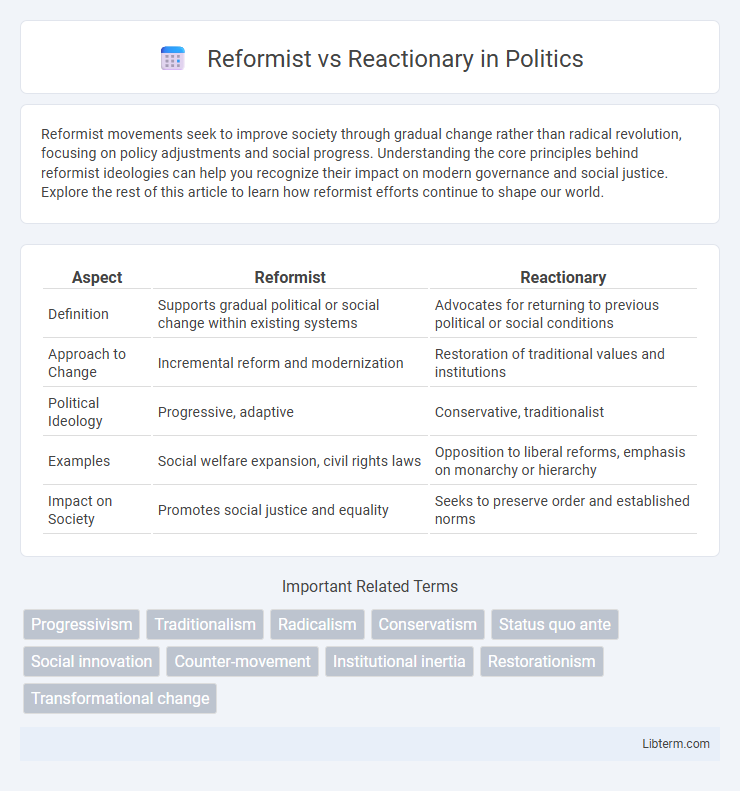Reformist movements seek to improve society through gradual change rather than radical revolution, focusing on policy adjustments and social progress. Understanding the core principles behind reformist ideologies can help you recognize their impact on modern governance and social justice. Explore the rest of this article to learn how reformist efforts continue to shape our world.
Table of Comparison
| Aspect | Reformist | Reactionary |
|---|---|---|
| Definition | Supports gradual political or social change within existing systems | Advocates for returning to previous political or social conditions |
| Approach to Change | Incremental reform and modernization | Restoration of traditional values and institutions |
| Political Ideology | Progressive, adaptive | Conservative, traditionalist |
| Examples | Social welfare expansion, civil rights laws | Opposition to liberal reforms, emphasis on monarchy or hierarchy |
| Impact on Society | Promotes social justice and equality | Seeks to preserve order and established norms |
Understanding Reformism and Reactionism
Reformism advocates gradual change through existing political structures, emphasizing improvement and adaptation within a system rather than its complete overthrow. Reactionism opposes progressive reforms and seeks to restore a previous state of social or political order, often resisting modern changes perceived as threats to tradition. Understanding reformism involves recognizing its pragmatic approach to achieving social justice, while reactionism prioritizes preserving established hierarchies and values.
Historical Roots of Reformist and Reactionary Movements
Reformist movements trace their origins to the Enlightenment era, emphasizing gradual social and political change through legal and institutional reforms. Reactionary movements historically emerged as responses to revolutionary upheavals, notably during the French Revolution, seeking to restore traditional hierarchies and resist progressive transformation. These opposing roots illustrate the enduring tension between advocates of modernization and defenders of established order across various historical contexts.
Key Philosophies: Progress vs Preservation
Reformist philosophy emphasizes progress through gradual change, advocating for social, political, and economic improvements based on rational reform and innovation. Reactionary thought prioritizes preservation, seeking to maintain or restore traditional values, institutions, and practices in response to perceived threats from rapid change or modernity. Both perspectives reflect contrasting approaches to societal development, where reformists drive evolution, and reactionaries resist upheaval to uphold continuity.
Political Manifestations of Reformism and Reactionism
Reformism manifests politically through gradual changes within existing institutions, emphasizing legislative amendments and social policies to achieve progressive goals. Reactionism opposes such transformations, seeking to restore traditional structures and resist modern reforms by endorsing conservative policies and authoritative governance. Key examples include reformist support for expanded civil rights versus reactionary movements advocating for the reinstatement of past hierarchies and social norms.
Social Impacts of Reformist and Reactionary Ideals
Reformist ideals promote gradual social change through policy adjustments, fostering inclusive progress and improved social justice by addressing inequalities within existing systems. Reactionary beliefs advocate a return to previous social orders, often resisting change and preserving traditional hierarchies, which can result in social stagnation or regression. The social impact of reformist movements typically includes expanded civil rights and increased social mobility, whereas reactionary actions may reinforce exclusion and social polarization.
Reformist Strategies: Change Through Evolution
Reformist strategies emphasize gradual change through existing political and social institutions, advocating for policy adjustments and incremental improvements to address societal issues. This approach supports evolutionary progress by working within current frameworks to implement sustainable reforms that reduce resistance and promote stability. By leveraging legislative processes, public dialogue, and institutional collaboration, reformists aim to achieve long-term transformation without disrupting established systems.
Reactionary Tactics: Defending Traditional Structures
Reactionary tactics emphasize the preservation of established social, political, and cultural institutions by resisting progressive reforms and advocating a return to previous societal norms. These strategies often involve mobilizing conservative constituencies, promoting nationalist rhetoric, and utilizing legal or institutional mechanisms to maintain hierarchical power structures. Such efforts aim to reinforce tradition as a foundation for stability, prioritizing continuity over innovation in governance and social organization.
Notable Reformists and Reactionaries in History
Notable reformists such as Martin Luther King Jr. and Mahatma Gandhi championed social justice and civil rights through nonviolent activism, influencing profound political and social reforms globally. In contrast, reactionaries like Joseph de Maistre and Juan Manuel de Rosas advocated for the restoration of traditional hierarchies and resisted progressive changes, often supporting authoritarian regimes. Their legacies highlight the enduring ideological conflict between progressive reform aimed at social evolution and reactionary forces committed to preserving established order.
Contemporary Examples and Case Studies
Reformist movements such as the Black Lives Matter campaign advocate for progressive changes within existing political structures, emphasizing police reform and racial justice reforms across the United States. In contrast, reactionary forces often appear in opposition to such movements, as seen in the resurgence of right-wing groups like the Proud Boys, who seek to restore traditional social orders and resist changes to racial and political norms. Case studies from recent years highlight this tension, with reformist protests calling for systemic change clashing with reactionary counter-protests defending established power hierarchies.
Future Outlook: The Ongoing Reformist vs Reactionary Debate
The future outlook of the reformist vs reactionary debate hinges on balancing progressive change with preservation of tradition, deeply influencing political and social dynamics worldwide. Reformists advocate for systemic transformation addressing contemporary challenges such as climate change, social justice, and technological advancements, driving innovation and inclusivity. Reactionaries emphasize restoring established norms and cultural heritage, aiming to counteract perceived destabilization from rapid reforms, shaping policy decisions and societal values in evolving democracies.
Reformist Infographic

 libterm.com
libterm.com